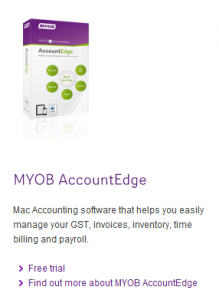 When you choose to study an online MYOB training course with EzyLearn, you learn every aspect of the MYOB software and how it applies to real-life business and accounting situations. Then, at the end of each module, you complete a test to prove to yourself (and your future employer, even) your knowledge of each module of MYOB, such as payroll, for instance.
When you choose to study an online MYOB training course with EzyLearn, you learn every aspect of the MYOB software and how it applies to real-life business and accounting situations. Then, at the end of each module, you complete a test to prove to yourself (and your future employer, even) your knowledge of each module of MYOB, such as payroll, for instance.
There are many people who will argue that tests aren’t necessary; that they’re just an exercise in testing how well you can store lots of information in your short-term memory, then forget it afterwards. They advocate, instead, that you’re marked on how well you performed on your overall coursework, and do away with exams altogether.
[quote]But the thing about an exam is that the better you know your coursework, the better you’ll perform.[/quote]
An exam is designed to taken be taken under pressure. They’re testing your knowledge of things that you are likely to encounter in your day-to-day, and may require you to act immediately. They’re not testing you on something that should be considered at length.
Even though EzyLearn offers lifetime access to our MYOB and Excel training courses, we still expect—in fact, we require it—that our students will pass each test at the end of each of the course modules.
There are a couple of reasons for this:
- The first, and this is probably the main reason, is that if you decide to, you can pay an additional fee to receive a certificate that shows you’ve completed and passed our online training courses. This can then be used to show potential employers that you actually know what you’re doing in MYOB—which for many accountants and bookkeepers is either a deal breaker or a deal maker.
- But an exam also forces you to study the coursework, whether it’s arbitrarily just to pass the test or thoroughly to make sure you understand and perform well in the test—and this largely depends on your own personal code of ethics. Even if you haven’t done a scrap of coursework before you go to complete a test, the mere fact that you have to complete and pass a test to progress through the course forces you to review the coursework.
It’s easy to cheat in any course by plagiarising someone else’s work. In the academic world, the ramifications involve being awarded an instant fail; in business, it usually involves legal action. But a person’s inclination to cheat and plagiarise someone else’s work raises other ethical questions that those respective punishments don’t address.
 I recently attended a networking event and spoke with someone who had completed a Cert IV in Small Business Management at a local BEC (Business Enterprise Centre)- they had completed a Government funded course and used the excuse of having to do the course as quick as they could so they could start their own business. The problem was that this person “encouraged” many of the students to work together (which is a good thing), but they ended up handing in the same assignment and in some situations forgot to change the name on their assignment!
I recently attended a networking event and spoke with someone who had completed a Cert IV in Small Business Management at a local BEC (Business Enterprise Centre)- they had completed a Government funded course and used the excuse of having to do the course as quick as they could so they could start their own business. The problem was that this person “encouraged” many of the students to work together (which is a good thing), but they ended up handing in the same assignment and in some situations forgot to change the name on their assignment!
Working together in a group is a fantastic way to learn because everyone has their own strengths and the really smart students can often be good teachers for the slow learners, but to simply replicate another persons work and not even use your own writing style and interpretation is very sad. It’s particularly sad when the Small Business Management course is designed to help you create an individual business plan for your own specific business.
[quote]Our assessors mark every assignment and provide individual feedback to ensure you properly examine your new startup business.[/quote]
This brings us to whether or not you would feel comfortable employing someone who had willfully cheated in a training course. Personally, we wouldn’t. Aside from that person displaying very little work ethic (they couldn’t be bothered to do the work themselves, so cheated instead), it also makes us wonder whether they would behave unethically in other ways—would they take our client base and start-up a rival business?
This is why we test our students at the end of each module, and only those students who receive a passing grade do, in fact, pass the course. It’s not because we think our students will cheat; it’s because we want our students to really learn and understand the coursework, so they can excel and succeed in business.


























